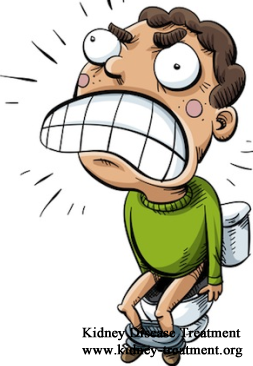Treating Constipation in End Stage Kidney Disease
2013-11-17 15:13
 People with End Stage Kidney Disease (ESRD), who stick with kidney-friendly diet plans, may suffer from constipation easily. This is because ESRD patients should restrict their fluid intake strictly. Besides, less intake of fiber may be another cause.
People with End Stage Kidney Disease (ESRD), who stick with kidney-friendly diet plans, may suffer from constipation easily. This is because ESRD patients should restrict their fluid intake strictly. Besides, less intake of fiber may be another cause.
If you are experiencing this problem, several methods may be helpful. Read on to find out them by yourself.
● Laxative
In our daily life, laxatives are often used to deal with constipation, and most patients can get relief with the help of these medications. However, for people with ESRD, they can’t eat laxatives blindly, since kidneys can’t filter out waste products of laxative decomposition effectively. From this point, you had better consult your family doctor or online doctor to determine which type of laxative you can take.
● Drink enough water as much as doctors suggest
With end stage kidney disease, extra fluid intake can increase the burden on kidneys, while lack of fluid can also cause some other problems. Among them, constipation is just one, so kidney patients should drink correct amount of water or vegetable and fruit juice every day. Additionally, limiting sodium intake is also necessary.
● Add fiber to your diet plan gradually
Fiber is one nutrition that can help alleviate constipation largely. Besides, it may also benefit these patients a lot, including:
- Keep gastrointestinal function healthy
- Increase urine output
- Help control blood glucose and cholesterol
- Prompt regularity
For ESRD patients, apple, blackberries, broccoli, cherries, carrots, celery, blackberries, etc, are good sources of fiber. However, not all patients can consume them freely, so you need to communicate with doctors firstly.
What’s more, regular exercise, drinking some herbal teas and taking a massage may also be helpful. You can choose some of them as you like.
- Tag: Chronic Kidney Disease Treatment
- Pre: Can Acupuncture Help With Chronic Kidney Disease
- Next: Advantages and Disadvantages of Chinese Medicine and Western Medicine for CKD
